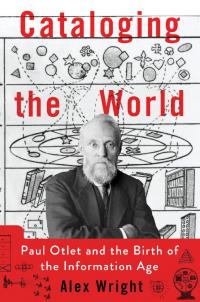Paul Otlet's new biography by New York Times columnist Alex Wright
A mere seventy years ago died Paul Otlet (1868-1944). Jurist, bibliographer, he founded the Mundaneum almost a hundred and twenty years ago with Nobel Peace Prize laureate Henri La Fontaine. As early as the 1920’s, Otlet imagined a system consisting of a telephone and a screen, allowing distant access to texts and images. He even anticipated several difficulties we experience today, like the storage and organisation of an ever-growing mass of data. Google acknowledged the Mundaneum as its archaeology and the UNESCO has inscribed the « Universal Bibliographic Repertory » on its Memory of the World Register. This June 2014, the nation of the Silicon Valley celebrates Otlet with Paul Otlet and the Birth of the Information Age, published by Oxford University Press.
 « Obsessive collector » for some, a visionary genius for most, Otlet used bibliography to describe notions of network, data linking, hypertext language and web semantics, decades before the Internet and the world wide web were invented. When publishing his “Traité de documentation” in 1934, Paul Otlet very early on placed Belgium on the information and communication technologies’ timeline. Years before the word « globalisation » appeared, Otlet and his collaborators’ ideas about information management were propagating worldwide. This internationalist ideal nowadays exists through an omnipresent Internet, a global economy and world organisations of government. The impact of Otlet’s works on the academic community can be measured not only in Belgium but on a worldwide scale: from Japan to Brazil through Russia, Canada, Australia or Sri Lanka, contributions to the study of this unique heritage are innumerable.
« Obsessive collector » for some, a visionary genius for most, Otlet used bibliography to describe notions of network, data linking, hypertext language and web semantics, decades before the Internet and the world wide web were invented. When publishing his “Traité de documentation” in 1934, Paul Otlet very early on placed Belgium on the information and communication technologies’ timeline. Years before the word « globalisation » appeared, Otlet and his collaborators’ ideas about information management were propagating worldwide. This internationalist ideal nowadays exists through an omnipresent Internet, a global economy and world organisations of government. The impact of Otlet’s works on the academic community can be measured not only in Belgium but on a worldwide scale: from Japan to Brazil through Russia, Canada, Australia or Sri Lanka, contributions to the study of this unique heritage are innumerable.
Retroact
Paul Otlet’s first biographer was an Australian student, Boyd Rayward (University of Chicago), who published his thesis in 1974 in Moscow. Almost thirty years later (2002), Belgian filmmaker Françoise Levie devoted a documentary and the eponymous 2006 book The man who wanted to classify the World to “the theorist of the League of Nations, inventor of the microfilm and the Universal Decimal Classification, friend to Le Corbusier and one of the forefathers of the Internet”. New York-based author Alex Wright now continues this biographical path across the Atlantic, positioning Otlet – and Belgium – at the genesis of the digital era with Cataloging the World: Paul Otlet and the Birth of the Information Age, published by the renowned Oxford University Press.
From the New York Times to the Mundaneum in Mons
Alex Wright knows the Mundaneum well, having visited more than once. In 2008, he dubbed it « The web that time forgot » in the columns of the New York Times where he ran the User Experience department. He also started a global buzz at the World Science Festival in June 2012, when he spoke of Otlet as a forefather of the concept of Internet during a panel with the “father of the Internet” himself, Vinton Cerf. Wright’s new volume covers some of the radical innovations Otlet foresaw in knowledge management, in collecting and in distributing information. Universal bibliography, universal book, and universal knowledge: Alex Wright tells of this ambitious dream. From the great projects supported by the Belgian government to generalized indifference in a world war context, the author uses Otlet’s singular experiment in Belgium to retrace the history of knowledge organization systems from a macro perspective.
This third biography launches at a key moment for the Mundaneum: 70 years after the death of its founder and a year from its 120th anniversary which will be celebrated with a big reopening in 2015, after a year and a half of renovation thoroughly transforming the archive centre.
Cataloging the World: Paul Otlet and the Birth of the Information Age by Alex Wright (Oxford University Press USA) is out in the United-States on 2nd June and in Europe on 10th July 2014.
BOOK WEBSITE: www.catalogingtheworld.com





